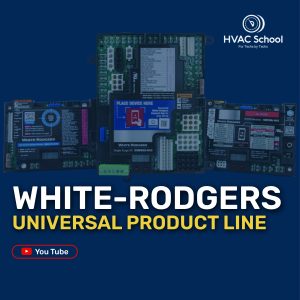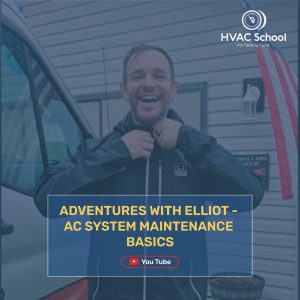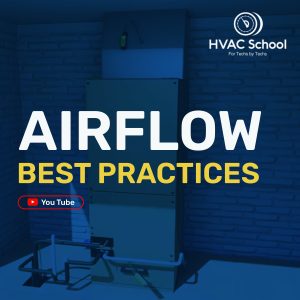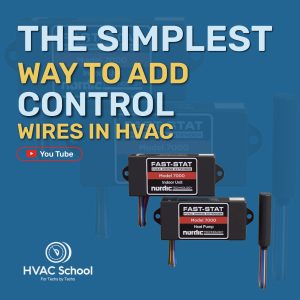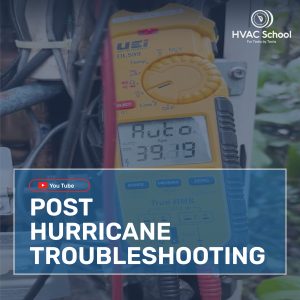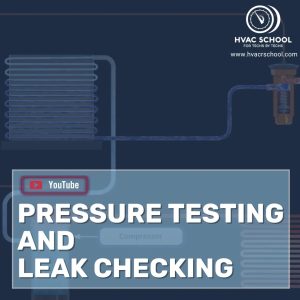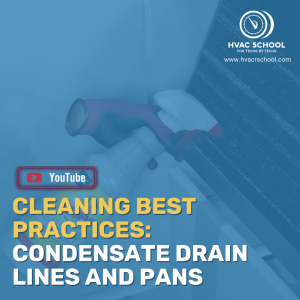BACK
 Combustion Testing Doesn’t Stop in the Summer
Combustion Testing Doesn’t Stop in the Summer
 The HVAC Technician’s Guide to Ensuring Comfort: Lessons from a Real-World Experience
The HVAC Technician’s Guide to Ensuring Comfort: Lessons from a Real-World Experience
 My Dad Changed HVAC & Me
My Dad Changed HVAC & Me
 3 Bad Reasons To Work Overtime
3 Bad Reasons To Work Overtime
 Mounting the TXV Bulb
Mounting the TXV Bulb
 Setting and Adjusting Superheat on a TXV System
Setting and Adjusting Superheat on a TXV System
 Kitchen Exhaust and Makeup Air
Kitchen Exhaust and Makeup Air
 Equipment Changes, Ducts are Forever
Equipment Changes, Ducts are Forever
 Brazing in TXVs: Best Practices
Brazing in TXVs: Best Practices
 Manufacturer Responsibility – Manifesto
Manufacturer Responsibility – Manifesto
 Q&A – Tips for Moving to HVAC Sales – Short #226
Q&A – Tips for Moving to HVAC Sales – Short #226
 White Shirt Techs – Manifesto
White Shirt Techs – Manifesto
 Q&A – Double Flares – Short #225
Q&A – Double Flares – Short #225
 Can You Coat Fiberglass?
Can You Coat Fiberglass?
 Redux – The Lost Art of Steam Heating w/ Dan Holohan
Redux – The Lost Art of Steam Heating w/ Dan Holohan
 Q&A on Superheat – Short #223
Q&A on Superheat – Short #223
 Duct Cleaning – How Long & How Often?
Duct Cleaning – How Long & How Often?
 Are EVs an Opportunity? – Short #222
Are EVs an Opportunity? – Short #222
#hvac
Tech Tips:
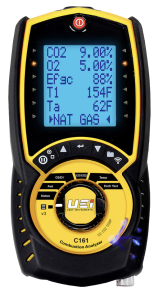
This tech tip was written by Casey Contreras. Casey is a field coach and instructor for the National Comfort Institute (NCI). Thanks, Casey! As HVAC technicians, our careers often focus on either cooling or heating. Because of this split view, we typically ignore gas-fired appliances during the cooling season. There are dangers lurking in any […]
Read more
This tech tip was written by Luke Peterson, the president of The Maintenance Department in Louisville, KY. Luke was a speaker at the 5th Annual HVAC Training Symposium in 2024 and has been on HVAC business panels at the symposium in 2023 and 2024. Thanks, Luke! As an HVAC technician, your primary goal is not […]
Read more
With Father's Day passing recently, I have been reflecting on my relationship with my Dad and how he has helped shape my journey through HVAC. It is more common than not to find people in residential HVAC to be a second or even third-generation tradesperson. Deciding to get into trade is easy when you grow […]
Read more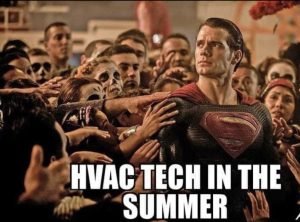
It’s easy to see yourself as a hero during the summer months. Desperate families in sweltering houses sing your praises after you quickly swap out that capacitor or install that new unit and the first blast of cold air comes out of the vents. Most companies make or break in the summer months, using the […]
Read more
This is a quick tip from the “Expansion Valves – What Does and Doesn't Matter?” livestream on our YouTube channel featuring Joe Shearer, Matthew Taylor, and Corey Cruz. Thermostatic expansion valves (also known as TXVs or TEVs) don’t have little brains that tell them when to open or close to maintain a specific superheat. They […]
Read more
This is a quick tip from the “Expansion Valves – What Does and Doesn't Matter?” livestream on our YouTube channel featuring Joe Shearer, Matthew Taylor, and Corey Cruz. As metering devices, TXVs can adjust the size of their orifice to maintain a constant superheat. Some TXVs are set to maintain a specific superheat from the […]
Read more
This is a quick tech tip derived from a short podcast episode in response to a question by one of our viewers, Gunther. You can listen to that episode HERE. If you would like to submit a question for the podcast, you can submit a voice recording on Speakpipe at https://www.speakpipe.com/hvacschool. Restaurants are commercial facilities […]
Read more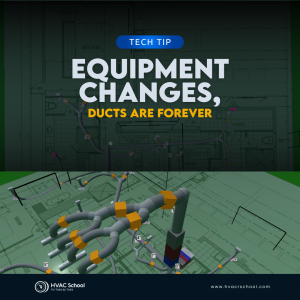
I’m installing the HVAC system for a house that is being completely gutted. It has vaulted ceilings throughout, and a small attic area was designated for mechanicals. The duct system can’t go in the attic because there basically isn’t one. The engineer intended the equipment to go in the attic mechanical space, and then the […]
Read more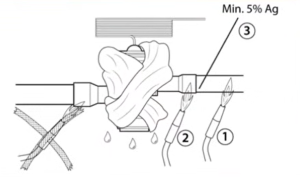
This is a quick tip from the “Expansion Valves – What Does and Doesn't Matter?” livestream on our YouTube channel featuring Joe Shearer, Matthew Taylor, and Corey Cruz. It’s time to talk about brazing again! Even though rehashing “flow nitrogen” and “use a wet rag” gets a little old, bad TXVs and callbacks also get […]
Read moreVideos:
Podcasts:
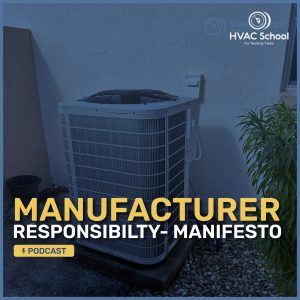
In this episode of the HVAC School podcast, Bryan shares his “Manufacturer Responsibility Manifesto,” a document he wrote over two years ago but held back from publishing until now. The manifesto addresses growing concerns about the burden being placed on HVAC contractors, particularly smaller businesses, due to manufacturing quality issues and warranty policies. The […]
Read more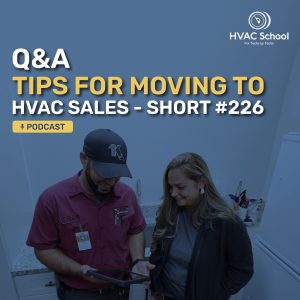
In this short Q&A podcast episode, Bryan answers a listener-submitted question and gives some of his tips for moving to HVAC sales from field technician/installer roles. The world of sales has a different pay structure, which makes it an appealing option to many technicians. Salespeople need to be able to have money conversations with […]
Read more
This unique podcast episode is a commentary on the phenomenon of “white shirt techs” in the HVAC industry – a term that refers to technicians who focus heavily on sales and maintaining a pristine appearance rather than technical expertise. While there's nothing inherently wrong with having good sales skills or maintaining a professional appearance, […]
Read more
In this short podcast episode, Bryan answers a listener-submitted question about double flares and their application in the HVAC/R industry. Flare connections are common in certain types of equipment, and they connect the copper to the appliance. As a result, when we make a flare, our goal is to make it leak-free. A regular […]
Read more
In this episode of the HVAC School Podcast, Bryan interviews Zach about duct coatings and their applications in HVAC systems, particularly focusing on the Hardcast RE500 product. The discussion delves into the importance of proper duct coating applications and their benefits for both contractors and customers. Zach, who has extensive experience in duct cleaning […]
Read more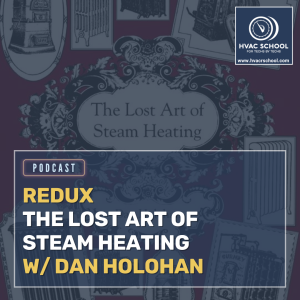
In today's podcast, Bryan talks with legendary Hydronics author and trainer Dan Holohan about the history of steam heating and some practical applications of old ideas. Recently, Dan has been working on more novels, having published two of them over the past few months. Steam heating is a “lost art” nowadays; it has become […]
Read more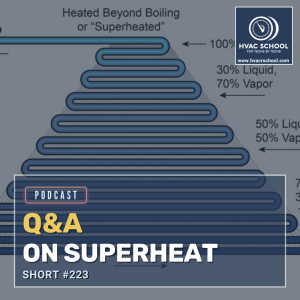
In this short Q&A podcast episode, Bryan answers a listener-submitted question about superheat, including what it is and how we measure it. Superheat is the number of degrees a refrigerant is above its saturation point. The saturation point is where you will have a liquid-vapor mix, so superheat only exists when a substance is […]
Read more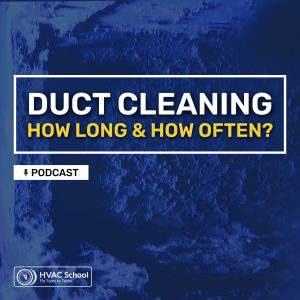
In this episode of the HVAC School podcast, Bryan interviews Zach from Southeast Clean Air Solutions about the intricacies of professional duct cleaning. Zach specializes in addressing duct cleaning challenges specific to the Southeastern climate, with a particular focus on fiberglass-lined ducts. The conversation delves into the complexities of cleaning different types of duct […]
Read more
In this short podcast, Bryan talks about electric vehicles and whether EVs present an opportunity for HVAC technicians. The residential sales lead at Kalos recently mentioned that keeping an EV in a conditioned garage is advantageous, and it's an upgrade we can offer our customers. In hot weather, EV battery performance and health can […]
Read more

